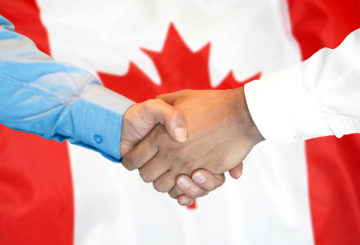
Working in a foreign country can be daunting. There are often a lot of unknowns that wouldn’t necessarily exist if you were accepting a job in your home country. Everything from the proper office attire, to addressing a superior, to understanding management styles, to business meeting etiquette can become a question. You want to begin a new job in a new country on the right foot, without missteps that could have been avoided with a little research. Here we try to sum up a few helpful hints for those embarking on a Canadian office adventure.
General Office Protocol
- Workplace communication is marked by formality, fairness, and political correctness.
- The business greeting is a firm handshake and direct eye contact.
- The proper way to address a new acquaintance is by title and surname.
- Office dress tends toward the conservative, especially in the larger cities.
- Avoid overly conspicuous, religious-themed apparel or accessories.
- Gift-giving is not common in the Canadian office culture.
- Women enjoy a high level of gender equality, but sexism and pay disparity persist.
- Sexual harassment, in or out of the workplace, is not tolerated.
- Diversity is appreciated, and workplace demographics are shifting toward minorities.
Business dealings in Canada are generally very similar to those in the United States, with a more formal business manner used in eastern Canada and a more casual manner in the western part of the country. It is important to note there also are regional differences in culture created by the sheer size of the country. For example, Alberta is generally considered to be more conservative than Ontario.
It is important to plan for inclement weather in Canada. Severe winters are not uncommon, and it is smart to prepare for snow, ice, and slush. Boots with good tread and insulation are a must, and a heavy coat is essential. You can bring a change of shoes to the office — or, keep a pair of dress shoes in your office at all times — so that you are not wearing your boots all day.
Management Styles
- Managers generally are informal and friendly; hierarchy is more closely observed in Quebec.
- Teamwork is valued, and collaboration is common in the office environment.
- Timelines, agendas, and adherence to deadlines are typical.
- In general, office hierarchy is meant to facilitate decision making.
- Office communication tends to be direct and slightly informal, regardless of rank.
- In Quebec, hierarchy and rank are more important than in the rest of the country.
- Academic achievement and experience are both important factors for a job promotion.
Management styles can vary widely in Canada. Most commonly, managers are informal and friendly, wishing to be seen as part of the team. The exception is in Quebec, where greater respect is shown to rank and hierarchy. Interpersonal and management skills are considered to be of vital importance to the Canadian manager. Managers are expected to be decisive, but an authoritarian or paternalistic style is not desirable. Growing competition in the Canadian job market has made credentials increasingly important.
The Canadian work environment tends to be collaborative. Many companies value teamwork, and individuals are expected to contribute ideas and opinions during meetings. In return, team members expect to be valued for their contributions to the team. Managers typically will consult subordinates and consider their input before making final decisions.
Business Practices:
- Meeting appointments should be made for the morning, and confirmed the day before.
- It is helpful to have a letter of introduction when making a new business acquaintance.
- Business cards are exchanged, and for Quebec should be translated into French.
- Business discussions typically are low-key; aggressive sales pitches should be avoided.
- Modesty, thoroughness, and directness are highly appreciated.
Follow @goinglobal
Tweet to @goinglobal
Information on employment outlook for more countries can be found by logging into your GoinGlobal account!
Don’t have an account? Sign up for a free online demo to learn how you can utilize GoinGlobal’s employment resources.



